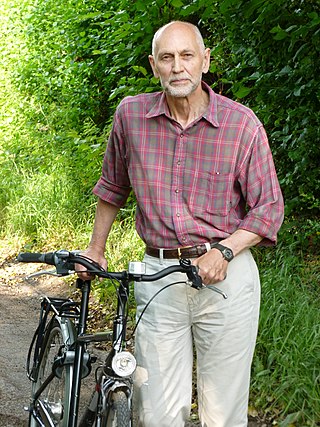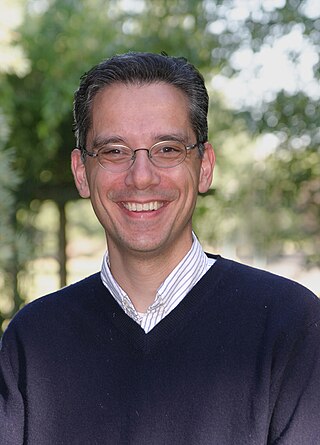Related Research Articles
Frank Plumpton Ramsey was a British philosopher, mathematician, and economist who made major contributions to all three fields before his death at the age of 26. He was a close friend of Ludwig Wittgenstein and, as an undergraduate, translated Wittgenstein's Tractatus Logico-Philosophicus into English. He was also influential in persuading Wittgenstein to return to philosophy and Cambridge. Like Wittgenstein, he was a member of the Cambridge Apostles, the secret intellectual society, from 1921.
Emergentism is the belief in emergence, particularly as it involves consciousness and the philosophy of mind. A property of a system is said to be emergent if it is a new outcome of some other properties of the system and their interaction, while it is itself different from them. Within the philosophy of science, emergentism is analyzed both as it contrasts with and parallels reductionism.
John Earman is an American philosopher of physics. He is an emeritus professor in the History and Philosophy of Science department at the University of Pittsburgh. He has also taught at the University of California, Los Angeles, Rockefeller University, and the University of Minnesota, and was president of the Philosophy of Science Association.

Nancy Cartwright, Lady Hampshire is an American philosopher of science. She is a professor of philosophy at the University of California at San Diego and the University of Durham. Currently, she is the President of the Division for Logic, Methodology and Philosophy of Science and Technology of the International Union of History and Philosophy of Science and Technology.

Frank Cameron JacksonFBA is an Australian analytic philosopher and Emeritus Professor in the School of Philosophy at Australian National University (ANU) where he had spent most of the latter part of his career. His primary research interests include epistemology, metaphysics, meta-ethics and the philosophy of mind. In the latter field he is best known for the "Mary's room" knowledge argument, a thought experiment that is one of the most discussed challenges to physicalism.

Gregory Paul Currie FAHA is a British philosopher and academic, known for his work on philosophical aesthetics and the philosophy of mind. Currie is Professor of Philosophy at the University of York and Executive Editor of Mind & Language.

William Ernest Johnson, FBA, usually cited as W. E. Johnson, was a British philosopher, logician and economic theorist. He is mainly remembered for his 3 volume Logic which introduced the concept of exchangeability.

Richard Bevan Braithwaite was an English philosopher who specialized in the philosophy of science, ethics, and the philosophy of religion.
Allan Fletcher Gibbard is the Richard B. Brandt Distinguished University Professor of Philosophy Emeritus at the University of Michigan, Ann Arbor. Gibbard has made major contributions to contemporary ethical theory, in particular metaethics, where he has developed a contemporary version of non-cognitivism. He has also published articles in the philosophy of language, metaphysics, and social choice theory.
Colin Howson was a British philosopher. He was Professor of Philosophy at the University of Toronto, where he joined the faculty on 1 July 2008. Previously, he was Professor of Logic at the London School of Economics. He completed a PhD on the philosophy of probability in 1981. In the late 1960s he had been a research assistant of Imre Lakatos at LSE. He died on Sunday 5 January 2020.

Lee Cameron McIntyre is a research fellow at the Center for Philosophy and History of Science at Boston University and an Instructor in Ethics at Harvard Extension School. He has published books and articles on the philosophy of the social sciences, as well as attempts to undermine science and the appropriate response to these attempts to scientists. In 2023 he became a fellow with the Committee for Skeptical Inquiry.
John Denis Sargan, FBA was a British econometrician who specialized in the analysis of economic time-series.

Gualtiero Piccinini is an Italian–American philosopher known for his work on the nature of mind and computation as well as on how to integrate psychology and neuroscience. He is Curators' Distinguished Professor in the Philosophy Department and Associate Director of the Center for Neurodynamics at the University of Missouri, St. Louis.
In philosophy, Weyl's tile argument, introduced by Hermann Weyl in 1949, is an argument against the notion that physical space is "discrete", as if composed of a number of finite sized units or tiles. The argument purports to show a distance function approximating Pythagoras' theorem on a discrete space cannot be defined and, since the Pythagorean theorem has been confirmed to be approximately true in nature, physical space is not discrete. Academic debate on the topic continues, with counterarguments proposed in the literature.
Christian List is a German philosopher and political scientist who serves as professor of philosophy and decision theory at the Ludwig Maximilian University of Munich and co-director of the Munich Center for Mathematical Philosophy. He was previously professor of political science and philosophy at the London School of Economics. List's research interests relate to social choice theory, formal epistemology, political philosophy, and the philosophy of social science.
Roman Frigg is a Swiss philosopher, Professor at the London School of Economics and Political Science and director of its Centre for Philosophy of Natural and Social Science. In 2016 he was awarded the Friedrich Wilhelm Bessel Research Award.
Dutch philosophy is a broad branch of philosophy that discusses the contributions of Dutch philosophers to the discourse of Western philosophy and Renaissance philosophy. The philosophy, as its own entity, arose in the 16th and 17th centuries through the philosophical studies of Desiderius Erasmus and Baruch Spinoza. The adoption of the humanistic perspective by Erasmus, despite his Christian background, and rational but theocentric perspective expounded by Spinoza, supported each of these philosopher's works. In general, the philosophy revolved around acknowledging the reality of human self-determination and rational thought rather than focusing on traditional ideals of fatalism and virtue raised in Christianity. The roots of philosophical frameworks like the mind-body dualism and monism debate can also be traced to Dutch philosophy, which is attributed to 17th century philosopher René Descartes. Descartes was both a mathematician and philosopher during the Dutch Golden Age, despite being from the Kingdom of France. Modern Dutch philosophers like D.H. Th. Vollenhoven provided critical analyses on the dichotomy between dualism and monism.
Computational philosophy or digital philosophy is the use of computational techniques in philosophy. It includes concepts such as computational models, algorithms, simulations, games, etc. that help in the research and teaching of philosophical concepts, as well as specialized online encyclopedias and graphical visualizations of relationships among philosophers and concepts. The use of computers in philosophy has gained momentum as computer power and the availability of data have increased greatly. This, along with the development of many new techniques that use those computers and data, has opened many new ways of doing philosophy that were not available before. It has also led to new insights in philosophy.
David Liggins is a philosopher at the University of Manchester with research interests in metaphysics and philosophy of mathematics.
The Hart–Devlin debate was a famous debate in the mid-twentieth century between legal philosophers Patrick Devlin and H. L. A. Hart about whether the law is a suitable tool for the enforcement of morality. The debate arose in the context of a proposal to decriminalize homosexuality in the United Kingdom. Devlin argued that the law is a suitable tool to enforce morality, while Hart disagreed.
References
- ↑ Science, London School of Economics and Political. "Richard Bradley". London School of Economics and Political Science.
- ↑ "Richard Bradley". personal.lse.ac.uk.
- ↑ Bradley, Richard (2017). Decision Theory with a Human Face by Richard Bradley. Cambridge Core. doi:10.1017/9780511760105. ISBN 978-1-107-00321-7.
- ↑ "Record number of women elected to the British Academy". The British Academy. 22 July 2022. Retrieved 14 August 2022.